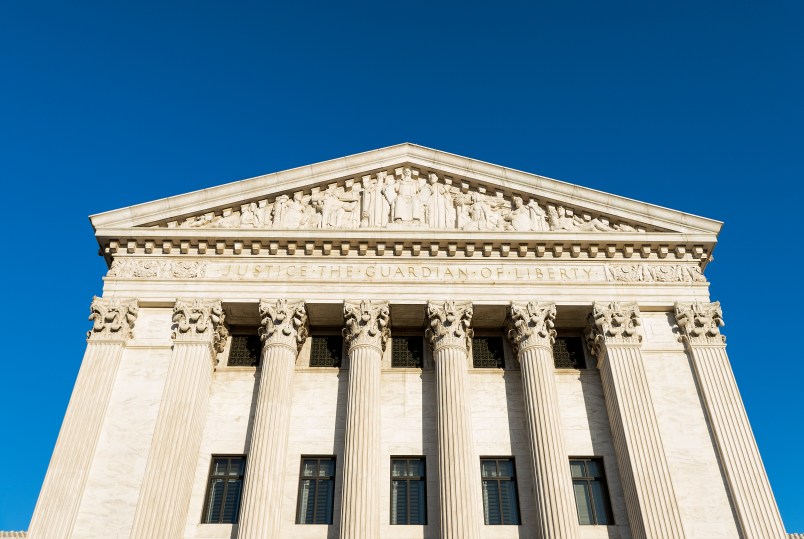WASHINGTON (AP) — The Supreme Court said Friday it will review a 2016 Arizona law that bars anyone but a family member or caregiver from returning another person’s early ballot. The law itself, however, remains in effect through the presidential election and until the justices rule.
The court will begin hearing arguments again next week after a summer break. The Arizona case was one of four cases the court, now eight justices because of the death of Justice Ruth Bader Ginsburg, agreed to hear in its new term that begins Monday. As is usual, the justices did not comment in taking the cases. Because of the coronavirus pandemic, the justices will not be returning to the courtroom to hear arguments but instead will continue hearing arguments by telephone. The court has been closed to the public since March.
In the Arizona case, a federal appeals court ruled in January that Arizona’s law banning so-called “ballot harvesting” violates the Voting Rights Act and the Constitution, but the court put its ruling on hold while the Supreme Court was asked to take the case.
The appeals court also found that Arizona’s policy of discarding ballots if a voter went to the wrong precinct violates the law. The court said both have a discriminatory impact on minority voters in violation of the Voting Rights Act.
The high court in recent years has weakened the Voting Rights Act, throwing out the most powerful part of the landmark law in 2013. It could use the current case to go even further.
The case began after Republicans in Arizona passed the law making it a felony to return someone else’s ballot to election officials in most cases and Democrats sued.
Both parties had used ballot collection in Arizona to boost turnout during elections by going door to door and asking voters if they have completed their mail-in ballot. Democrats used the method aggressively in minority communities and argued their success prompted the new GOP-sponsored law. Republicans argued the law was aimed at preventing election fraud.
Arizona Attorney General Mark Brnovich, a Republican, said in a statement he is pleased the court will hear the case.
The justices also said Friday they will review a longstanding effort by the Federal Communications Commission to relax restrictions in individual media markets on ownership of different forms of media — TV stations and newspapers — over fears that it would leave fewer outlets controlled by minorities.
The court also will take up cases involving how immigration officials evaluate the claims of asylum seekers and a lawsuit by the city of Baltimore against BP Inc. and other energy companies seeking money for their contribution to climate change, although the issue before the justices is a technical one involving where the case should be heard.
The Supreme Court has already filled its argument calendar through December, so none of the cases will be argued before January 2021.







This is bullshit. The Rethugliklan Voter Suppression Team® went to court and lost. Then they appealed it and lost. The judgement should’ve stayed in place until the SCOTUS overturned it.
Here we go…watch closely which cases the new Republican court takes, because those will be the ones that they think they can use as vehicles to overturn every progressive policy possible. This one looks like at attack on the Voting Rights Act, in the hopes that killing it allows Republicans to get away with all kinds of voter suppression efforts.
They are going to argue this just as the next administration takes office…if it works out that it’s the Biden administration, backed by a Democratic Senate, all they are going to do is give them cover to create a new voting rights act, one that extends voting and cuts out Republican cheating. And, people are going to be behind it, simply because it’s easy to understand that going back to Jim Crow when it comes to the vote is just wrong. If the Republican SC follows a path of undoing everything people want from their government, it will instead be their undoing.
Why are we required to vote in a single specified location? I can see the administrative convenience of the precinct workers confirming you are on the rolls and are who you say you are, but in reality, if you are eligible to vote it should not matter where you actually, physically vote or how you get your ballot submitted. Your right to vote should be as unconstrained as possible, in a perfect world.
If THAT concept were held up, boy would that open a few things up. If the physical location requirement were removed, I could probably support requiring some form of ID to be presented (among multiple options as to the form of the ID and also requiring the states to make getting an ID as easy as possible).
Boy, can you imagine how the counties would make more voting sites open in minority neighborhoods so “those people” don’t wander into the better kept and appointed voting sites in the “nicer” parts of town?!?
This is what the roberts court does. Affected election coming up? Congressional subpoena gonna expire? We’ll get right on that in nine months.
The quantum-mechanical explanation is better than the quasi-legal one.